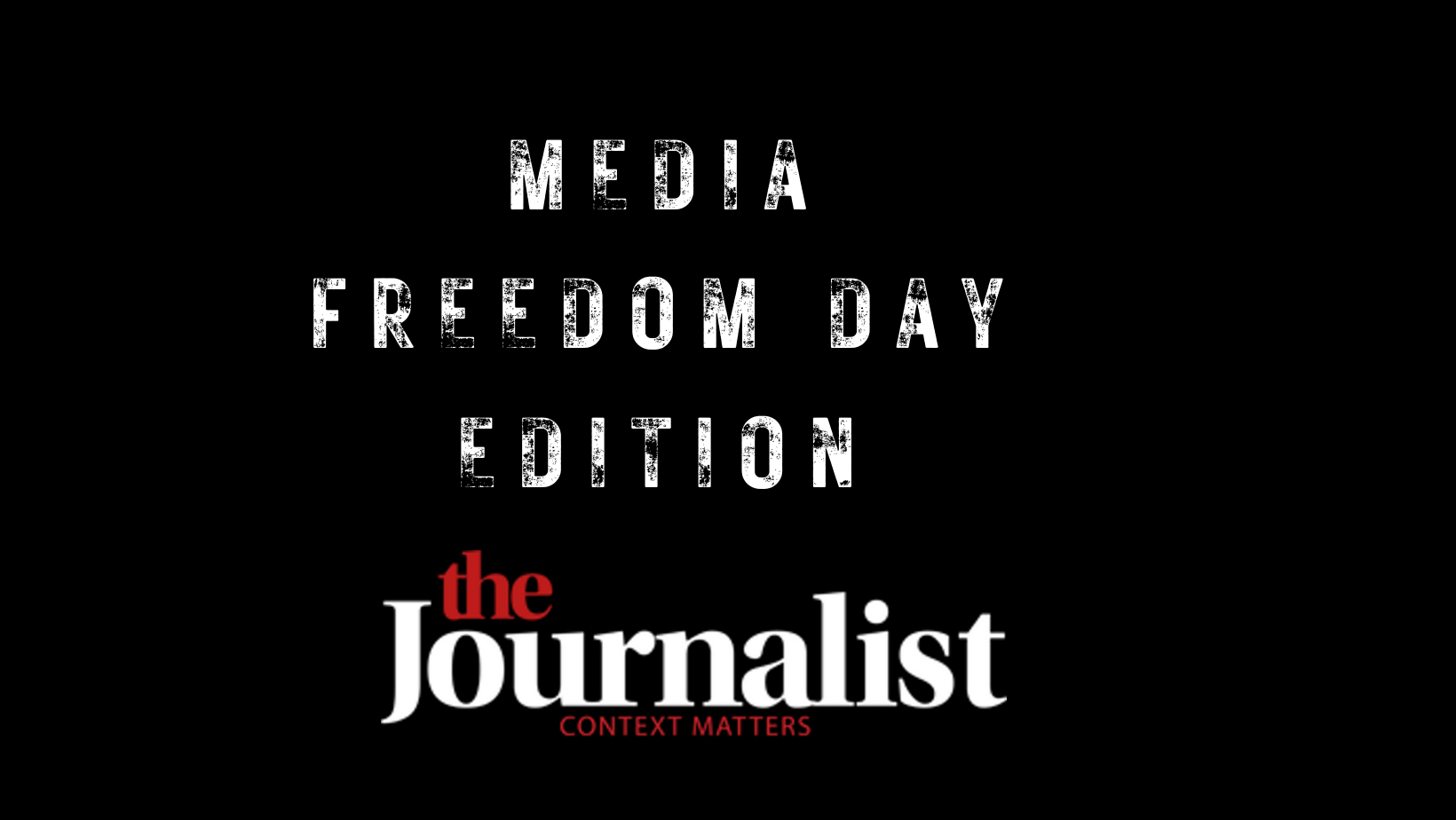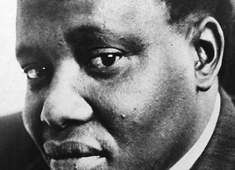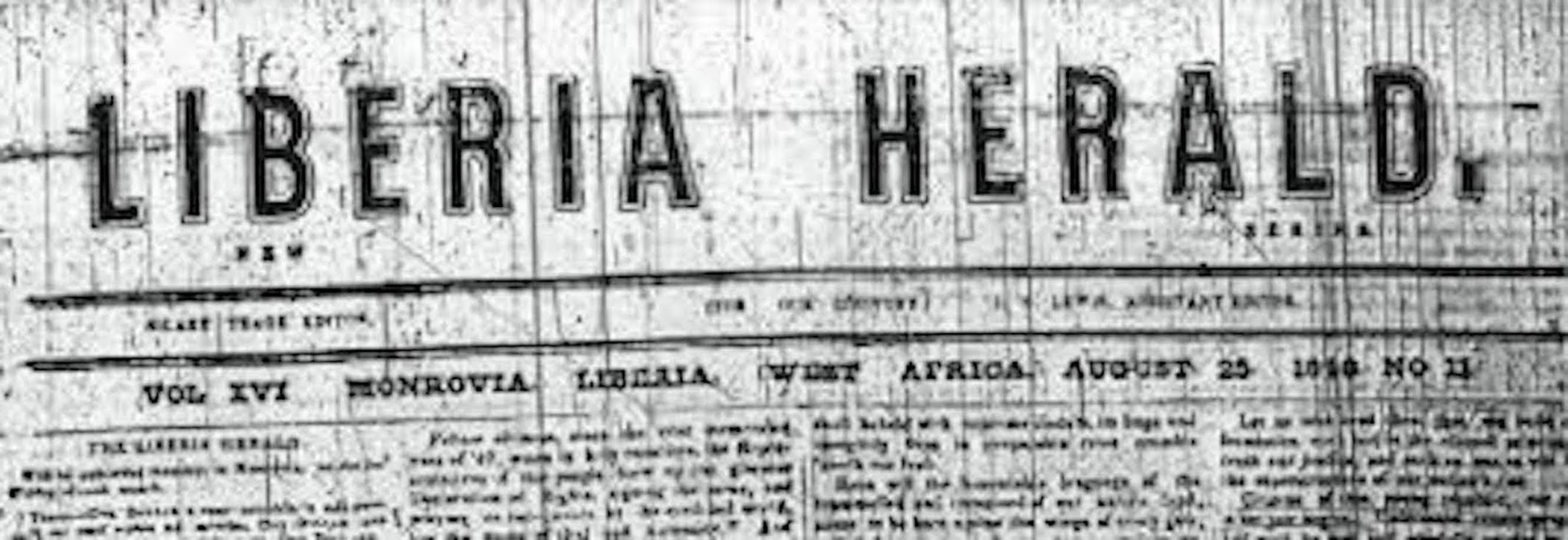The late Ernest Mancoba, painter and sculptor, should be to South Africans as Van Gogh is to the Dutch and Picasso is to the Spanish. He, like others, have for too long been excluded from the South African narrative. He is considered to be in a class of his own and yet his work is not sufficiently studied at South African universities or art schools. The father of writer Njabulo Ndebele, Nimrod Ndebele, a playwright and friend, is known to have described Mancoba as the leading intellectual of his generation in the 1930s.
Spotlight
About this page
Never in history has it been so easy to accumulate information. A vast sea of stories flows ceaselessly through the devices at our fingertips. But some days I feel I am drowning in data that does not help me understand the world any better.
Edward R Murrow’s warning about TV in 1958 could just as well be applied to all our modern information sources:
“This instrument can teach. It can illuminate and, yes, it can even inspire. But it can do so only to the extent that humans are determined to use it towards those ends. Otherwise, it is merely wires and lights in a box.”
It is what we do with the information at our disposal that determines our destiny.
I once had a news editor when I worked on a small broadsheet newspaper in Cape Town who would cut me down to size by reminding me that my feverish efforts at storytelling would soon be “fish n’chips wrapper”. Undeterred I sat at my Olivetti typewriter for hours until I was happy with the stories.
In 2014 when we launched The Journalist we had a section called News. Our aim was and is to explore the meaning behind the lights and wires. To avoid at all costs becoming electronic ‘fish n’chips wrapper’.
Since then, we have chosen to rework this section of our website and in line with our updated approach it is called SPOTLIGHT. It is a name that evokes images of performers plucked out of the darkness of the stage and bathed in light so that the audience can revel in their artistry.
Spotlight will feature the artistry of our finest writers. Their brief will be simple. Don’t merely tell us what happened. Help us understand why.
If you have an idea for a Spotlight story please engage in the discussion or use the Contact Us page to write and let us know what you are thinking.
If we are indeed the end result of all the stories we’ve heard, as Tim Knight says, choose carefully. The Journalist is committed to help you make that choice and to shed light on the 21st Century clutter.
Towards a new national narrative
Shepherd Mphofu and Zubeida Jaffer Despite the attainment of democracy in 1994, South African children continue to understand their history as one which coincides with colonialism. The authors outline a way forward to tell a fuller story of the people of this part of the world. South Africa’s transformative national narrative sprung from the intellectual strata. Way back in 1911 a South African lawyer, Pixley ka Isaka Seme, delivered a lecture that gave intellectual stimulation to the...
In defiance of prejudice
South African soprano Pumeza Matshikiza has come home to present a special solo concert at the Roodepoort Theatre on 2 November 2021. She will sing a selection of opera arias and traditional South African songs from her current repertoire.I was fortunate to be invited to preview the show with family and friends at the theatre on Friday 15 October 2021. She and her accompanying pianist Paul Ferreira received several standing ovations from the enthusiastic audience.
Decolonising Journalism Education
Ylva Rodny-Gumede, Colin Chasi, Zubeida Jaffer and Mvuzo Ponono There is no doubt that in the 21st century, journalism is undergoing radical and fundamental change. Journalism worldwide is adapting to an ever changing digital and social media environment with competing forms of information dissemination, and stricter if not harsher economic conditions. In South Africa, questions regarding whether journalism will survive this time of flux are often coupled with further enquiry around the role...
Rediscovering grandeur in ourselves
Vusi Mchunu Mazisi Kunene believes that through performance and celebration, we rediscover the splendour, the grandeur in ourselves. Central to all these elements of orature is performance. Story, riddle, proverb and dance constitute a performance genre. The carnival takes place in the streets. Dance is a celebration of form over fixity, a momentary triumph over gravitational pull, a symbolic conquest of gravity. In the vein of Afro-Brazilian capoeira, it becomes an anti-oppression martial...
Politics and Media Freedom
Dr. Onkgopotse JJ Tabane Dr. Onkgopotse JJ Tabane argues that media and politics cannot be separated as both exist within the public sphere which should ideally afford all freedoms of expression. The Journalist publishes this commentary and excerpts from Tabane’s PhD research Bridging The Gap: An Analysis Of The Complicated Relationship Between The Government And The Media 23 Years Into Democracy. The tension that is alive between media and the government is caused by wrestling for either to...
Black Wednesday Edition
As South Africa commemorates the 44th anniversary of this day – October 17, 1977 – which, in history became a dark spot and a reminder to reflect on how freedoms of expression were trampled upon, violated and suppressed by the apartheid government, this edition examines where we are today and where South Africa needs to be, looking into the future as we guard against tampering with all freedoms provided for in the Constitution’s Bill of Rights, including the media’s. The Journalist team has...
The history of SA’s Media Freedom Day
Ongeziwe Babane and Phindile Xaba What came to be known as Black Wednesday – October 19, 1977 – has left an indelible blemish on the history of the National Party’s (NP’s) rule and its suppression of freedom of expression. On this bleak day, then apartheid state minister Jimmy Kruger clamped down on the media leading to the closure of The World and Sunday World, and the Christian Institute's publication Pro Veritate that was edited by anti-apartheid activist and Dutch Reformed Church...
Media Freedom Statement
Zubeida Jaffer, Shepi Mati, Frank Meintjies and Phindile Xaba South Africa has come a long way from the dark day of October 19, 1977 when the Apartheid regime squeezed the noose tightly around press freedom. Known as Black Wednesday, the day has appropriately become the official South African Media Freedom Day. On that day in 1977, the whites-only racist government banned 19 Black Consciousness Movement organisations and detained scores of activists. It further closed The World and Weekend...
Writing Ourselves Into History: The liberating narrative of who we are
Sylvia Vollenhoven“My initial foray into the world of telling stories for a living leads me into a media environment that requires you to leave your critical faculties behind.
Sol Plaatje – a writer as the righter of past (mis)representations
Sabata-mpho Mokae “I have been busy writing two books. One is a novel - a love story after a manner of romances; but based on historical facts. The smash up of Barolongs at Kunana by Mzilikazi. The coming of the Boers and the war of revenge which smashed up the Matabele at Coenyane by the Allies, Barolong, Boers and Griqua when Halley’s Comet appeared in 1835 - with plenty of love, superstitions and imaginations worked in between the wars. Just like the style of Rider Haggard when he writes...
Can Themba – A form of self-liberation
Frank Meintjies Can Themba’s contribution to freedom of expression straddles journalism and work in fiction and poetry. And we have much to learn about the underlying drive that informed his work – a focus on the stories and lives of ordinary people. Themba’s life testifies to a commitment to both journalism and creative writing, even though his gainful employment was squarely in the sphere of journalism and, at certain points, teaching.
THESIS Of – Onkgopotse JJ Tabane
BRIDGING THE GAP: AN ANALYSIS OF THE COMPLICATED RELATIONSHIP BETWEEN GOVERNMENT AND THE MEDIA 23 YEARS INTO DEMOCRACY Download the full paper on this link: 77X OJJ TABANE FINAL THESIS AS OF 25 APRIL 2020 (1) (2) (1)
Participants at the Seminar on promoting an independent and pluralistic African Press, Windhoek In 1991
Darryl Accone Below is a list of participants including journalists, country representatives, authors and observers who attended the seminar on promoting an Independent and Pluralistic African Press, Windhoek in 1991 where the Declaration of Windhoek was produced and signed. Country Participants Algeria Omar Belhouchet Mayouf Zoubir Souissi Angola Joaquim Pinto Andrade Benin Ismaёl Yves Soumanou Thomas Megnassan Botswana Methaetsile Leepile Burkina Faso Albert Mbonerane Cameroon Pius N. Njawe...
Discovering Clements Kadalie’s writing
Thapelo Mokoatsi Clements Kadalie, known for being the first black national trade unionist in Southern Africa, was more than a labour activist. He has been described by Henry Mitchell, a young historian currently completing his PhD research on Kadalie, as a mediator, interpreter and broker between diverse publics, advocating for workers’ rights.
Pioneers: Swazi Queen Labotsibeni
Thapelo Mokoatsi Founder and financier of Abantu Batho – Swazi Queen-Mother Labotsibeni Mdluli was a force to be reckoned with. Queen Labotsibeni Mdluli was born in 1858 at eLuhlekweni northern Swaziland (now known as Eswatini) during the reign of King Mswati II who was in power for 25 years between 1840 and 1865.
Apollonia Mathia: A rock of Sudanese journalism
Phindile Xaba Apollonia Mathia was a rare gem – a women’s rights activist and journalist – who fought tirelessly before South Sudan’s liberation from the Khartoum regime. She defied all odds in the turbulent post-conflict region, fought hard for a free media, advocated for women’s voices to be heard and used the media as a tool to advance gender equality. Starting out as a radio reporter, Mathia progressed to become a print journalist. Mathia survived the turbulent political years and had the...
Sol T Plaatje: Pariah In the Land of His Birth
Zubeida Jaffer and Sibusiso Tshabalala Sol Plaatje cannot give us all the answers, but his works teach us two indispensable lessons. First, to be a humanitarian it is not necessary to efface and extinguish one’s own cultural identity and heritage. Second in honouring one’s own language and history it is entirely unnecessary to dishonour the language and history of anyone else. Kader Asmal - Foreword to Plaatje's Native Life In South Africa Solomon Tshekiso Plaatje was a journalist...
Allan Kirkland Soga
Thapelo Mokoatsi Allan Kirkland was an influential African intellectual in the early 20th century, and through his editorship at Izwi Labantu and leadership in SA Native Convention he amplified the movement towards liberating Africans. Allan Kirkland Soga, aka AK Soga, born on November 20 1861 in the Cape Colony. The youngest son of the legendary Tiyo Soga…
Pioneer: Helen Nontando (Noni) Jabavu
Phindile Xaba Writer and journalist Helen Nontando “Noni” Jabavu was a pioneer in many fields. She was the first black South African woman to publish autobiographies. In a remarkable career, she studied music, was a prolific writer, had a stint as a radio host for the BBC and worked as a film technician, semi-skilled engineer and oxyacetylene welder, working on bomber engine parts during the Second World War. Helen Nontando Jabavu was born on August 20 1919 into a family of literary figures...
Nnamdi Azikiwe: African philosopher, scholar and eminent journalist
Phindile Xaba Apart from having been the first president of Nigeria, Nnamdi Azikiwe was a Pan-Africanist who revolutionised the West African newspaper industry. Like most African journalists who were propelled into the media space by the liberation struggles against colonisers, Dr Benjamin Nnamdi Azikiwe, also known as “Zik” was no exception. Jomo Kenyatta of Kenya, Julius Nyerere of Tanzania and Kwame Nkrumah of Ghana, were all activists before they became journalists and subsequently...
Hilary Teague (1802-1853): Father of Liberia’s independence
Phindile Xaba Hilary Teague’s struggle for Liberia’s independence from the American Colonisation Society (ACS) is one that may have fallen through the cracks of history, but like his resilience it has emerged from the shadows over time. Hilary Teague is being celebrated in contemporary times as the Father of Liberia’s independence and the foremost pioneer of the Liberian media. His legacy has also become an interest in scholarly works and literature, aptly so. According to Dr Patrick Burrowes,...
Sophia Yilma Deressa: Ethiopian media legend
Phindile Xaba Ethiopian media legend, whose legacy remains engraved in the hearts and minds of her compatriots for her social change agency, has nerves of steel. Once incarcerated without trial, her parents were imprisoned and her husband was executed for unknown reasons. She endured all this under the Derg regime but continued her unwavering civic activism until independence. Sophia Yilma Deressa has come full circle. She and her five siblings lived and travelled all over the world and...
A gift to the world from African journalists
African journalists have given the profession World Press Freedom Day. Thirty years ago on 3 May 1991, they crafted and adopted the Windhoek Declaration on Press Freedom that remains the basis of this important day.

About Us
The Journalist is a ground-breaking media project that provides history and context for key issues facing South African journalists. The Journalist is an independent, not for profit organisation working with the academic community and a range of credible online entities to make knowledge more accessible to the wider public. We don’t only tell you what happened. We help you understand why.
Our Partners
Republish Articles
We want our stories spread far and wide. Feel free to republish our articles, but please credit our writers and authors and credit The Journalist at the top or bottom of the article complete with a hyperlink back to the site.
Donate
The Journalist is a non-profit organisation and relies on public funding. Please consider donating to ensure more issues in the future.
Account name: The Journalist / Bank: Standard Bank
Branch Code: 026209 / Account number: 270320830





























